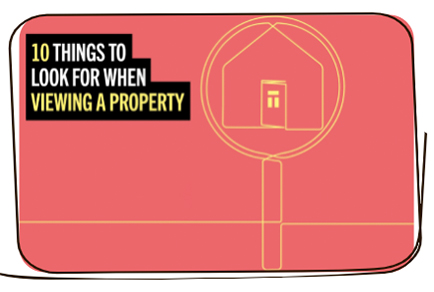Get helpful background information for each property
It's common when viewing a potential property that an estate agent shows you round and tells you some basic information about the home. But as industry experts is there extra information they have that would be useful to you in the decision making process? In this guide we reveal 10 things you could consider asking to leave you armed with as much information as possible.
1. Why are the current owners selling?
Whilst it’s not always a clean cut answer (because they don’t want to put you off), you might be able to glean some useful information. Are they moving for an easier commute (traffic could be bad), to upsize (perhaps they’ve quickly outgrown it), for schools (check them out if you plan to raise a family there), or is there something else that you need to consider?
2. How long has the property been on the market and how much interest has it had?
You can usually tell from an online listing how long a home has been up for sale. Just because a home has been on the market for a while doesn’t make it automatically bad. It could have poor staging for viewings or be in poor condition – things to be mindful of when you look around. It could also be that the price is too high or that the seller is stubborn. Try and understand if the reason is something that could affect you when you decide to move on as part of the consideration process.
Equally, don’t be whipped into a frenzy by a home that’s new to the market with a lot of interest. Remember that as part of the mortgage process a valuer needs to approve the price you’re paying for the home, so getting into a bidding war and offering over the odds won’t help you in the long run. Keep your cool and offer only the price you think the property is worth, taking into account any work/updates required.

3. Have the current owners already found somewhere else to go
If they have yet to start their search or are keen to buy in a fast-moving area it could indicate a slower timeline. Would they be prepared to rent in the event they can’t find what they are looking for?
If you offer a delayed completion would they be prepared to exchange contracts so you have confidence that the purchase will go ahead? Equally, the seller may be under time constraints to move quickly, in which case presenting your position favourably may aid your appeal as a buyer. Either way, being fully informed from the offset will save anguish later for both parties.
4. Who set the asking price?
Was it the agent, keen to win the instruction to market and sell the property? Or did the seller determine the price, in which case you may be able to glean information about what value the estate agent recommended to guide you in what to offer.
5. Have there been any previous offers on the property?
Knowing why previous offers have been refused will help you frame your own offer when you make one. It may be that the seller is price-driven, or that they are looking for a quick, chain-free sale. It’s worth understanding and highlighting your situation as part of any offer you make, such as letting them know you are a first time buyer.

6. Will the seller remove the property from the market for a good offer?
Putting the ball in the seller’s court could help you understand their position – if they’ve found their next dream home, they may share their bottom line with you in order to confirm an offer and enable them to move on too. It may also reveal that a mass of interest means they are not prepared to take the property off the market until all potential buyers have viewed the home. If that’s the case, any offer you make could simply act as a bar for others to jump over.
7. Other than price, are there factors which are important to the seller in deciding who to sell to?
Whilst price is important, sometimes other factors count. Flexibility, dependability, proactivity and timeliness can all be attractive to a seller. In some cases, having similar qualities to the seller may also provide an emotional sway for them to choose you – being local, looking for a family home etc. Include any details that position you as an attractive buyer when you put an offer forward.

8. Is it freehold or leasehold?
If the property you are buying is freehold it means you are buying the property and the land it is on outright. If it’s a leasehold property it means you are ‘leasing’ (renting) the right to use the property for a set number of years – which can extend up to 999 years but can also be significantly shorter. Leasehold properties come with a few conditions including a requirement to ask permission for any major works you want to carry out and annual charges for ground rent and maintenance services. If a property has a short lease you can pay to extend the term, but this comes at a cost, so if it’s something you have to do rather than the seller, you need to factor this in to the purchase price you are offering.
9. Who are the neighbours/have there been any issues?
Talking to the neighbours is a great way to get a feel for the area you plan to buy in. Ask existing residents about the neighbourhood and how long they’ve lived there. A large number of long term residents will indicate it’s a nice place that people don’t want to move away from. They might even be able to tell you more about the specific property you are interested in. Try to remember that your interpretation of good and bad neighbours might differ from someone else’s (you may like social neighbours, others may prefer silent!). Your solicitor should investigate any problems or disputes with problem neighbours for you – failure to disclose issues that are later brought to light can give means to legal recourse.

10. Has there been a previous survey on the property?
If there has been a recent survey on the home it could save you both time and money. Ask the agent to find out if this is the case. Legally the agent and seller are obliged to provide you with any information which could have a material impact on the purchase.
More mortgage guides you may find helpful...

Mortgage jargon buster guide
We try not to use industry jargon when we’re talking about mortgages, but some terms and phrases just can’t be replaced. In this simple guide we simply explain the lingo you’re most likely to encounter.

10 things to look at when viewing a property
Viewing a potential home for purchase is really exciting, but whilst a “good feeling” is important, it’s also worth considering more practical aspects whilst looking around. In this short guide we share 10 things to look at when viewing a property you’re considering purchasing.

Estate agent jargon buster guide
There are already so many things you have to consider and research while on your home-buying journey, so we have collected a bunch of words or phrases you may come across, to help simplify the process.
